IN THE RECENTLY CONCLUDED SARAWAK STATE ELECTIONS, I had a unique opportunity to be involved in part of the election campaign rather than reading and observing the process from the outside. I was based in Sibu for two weeks, as part of the Democratic Action Party’s campaign there. During the campaign, I tweeted that it was an ‘exhilarating, exasperating and exhausting affair’. I learnt things about the electoral process which I would never have otherwise learnt as an outsider. The following article is a summary of my observations and reflections on various salient aspects of the electoral process. I strongly encourage anyone reading this to seriously consider getting yourself involved in an election campaign, as a party volunteer for any of the Barisan Nasional or Pakatan Rakyat parties, or ‘merely’ as a polling or counting agent. There is nothing like the experience of getting your hands dirty, so to speak, to learn first-hand about the electoral process.
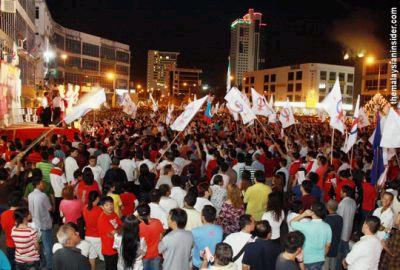
The first salient point about the electoral process is actually a positive note. Well, sort of. One of the most effective ways in which an opposition party gets its message across to voters during an election campaign is through ceramahs or public speeches. While there were some online reports documenting the restrictions faced by Anwar Ibrahim when he was giving ceramahs in some of the more rural areas before the campaign; in the major cities, thousands thronged to listen to opposition leaders from Sarawak and from Peninsular Malaysia speak on various topics, including Taib Mahmud’s long tenure as Chief Minister in the state and the wealth he and his family have amassed over the years; the hollow nature of Prime Minister Najib’s 1Malaysia; the ineffectiveness of SUPP leaders in the state government and the viciousness of the personal attacks against Anwar and also Pakatan Rakyat’s own governance record in Penang, Selangor and Perak.

The police permits, on the whole, were relatively easy to come by and the Election Commission teams that were supposedly monitoring some of the ‘hot’ seats were mostly absent. Those who came to listen also generously donated to the opposition campaign, bought books by various Pakatan leaders and of course, the ubiquitous Ubah, both small (RM10) and big (RM60).
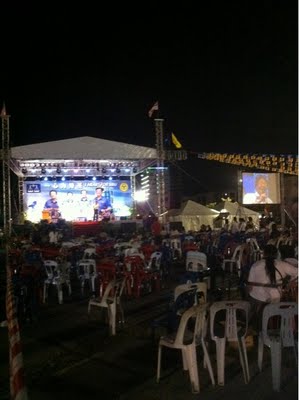
By contrast, the ceramahs organized by the BN parties were sparsely attended, many failing even to attract more than a hundred people (not including ‘spies’ from the opposition and party volunteers). Even the presence of Chinese pop stars such as Guang Liang and Zhang Dong Liang failed to attract crowds that could rival those attending the opposition ceramahs.
This, I suppose, is an example of voting with one’s feet, literally. Prospective voters will listen to voices and information sources which they usually cannot have access to and shun those voices which have less interesting things to say. For this part of the electoral process, I am thankful that no serious restrictions have been placed on opposition parties, at least during the campaign period.
I have two policy questions and concerns with regard to this aspect of the electoral process. Firstly, I wonder if it is legal for opposition parties to solicit donations and to sell books and merchandise during these ceramahs. Please do not misunderstand my concerns here. I am not advocating that the opposition be disallowed from seeking campaign funds in this manner. The huge discrepancy between the resources available to the BN and to the opposition parties necessitates fundraising whenever the opportunity arises. But will there come a time when the EC prohibits the opposition from collecting donations during ceramahs because it contravenes a provision in the Elections Offences Act? Secondly, I wonder if anyone has bothered to ask the BN parties how much it cost to bring in one of these pop stars to perform and if the sum total spent on all these pop stars exceed the official spending limit currently set at RM100,000 for state seats and RM200,000 for parliamentary seats. As an aside, one wonders how these pop stars add value to one’s campaign message from a substantive/policy standpoint.
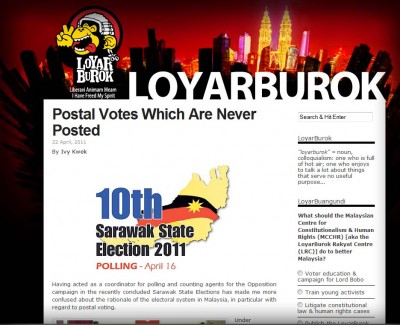 The second salient point has to do with the issue of postal votes. Here, I’d like to point readers to Ivy Kwek’s excellent article on the ‘Postal Votes Which Are Never Posted‘ on this Blawg. Her main points are that the EC was allowed to add civil servants to the postal voters list right up to the day before elections and that many of these civil servants go to the EC office to cast their postal ballots which calls into question why they need to be included in the postal ballot list in the first place. I shall only add the following points with regard to postal ballots.
The second salient point has to do with the issue of postal votes. Here, I’d like to point readers to Ivy Kwek’s excellent article on the ‘Postal Votes Which Are Never Posted‘ on this Blawg. Her main points are that the EC was allowed to add civil servants to the postal voters list right up to the day before elections and that many of these civil servants go to the EC office to cast their postal ballots which calls into question why they need to be included in the postal ballot list in the first place. I shall only add the following points with regard to postal ballots.
Many of the late insertions into the postal ballot list were civil servants who were ‘transferred’ to the Sibu seats to be on duty on polling day. Some of them are from nearby seats but there are many who are from areas far away from Sibu. If the premise of single member constituencies is that only voters who live or have some connection with a constituency have the right to vote for the representative in that constituency, why is it that a civil servant who is transferred all the way from Miri or Baram or Kuching has the right to cast a postal vote for the representative in Sibu? Especially since that civil servant will return to his or her ‘regular’ voting constituency after the conclusion of the state elections? This really boggles the mind but it does not seem to be of concern to the EC, which otherwise insists on voters being registered in seats according to their IC addresses and which still deny Malaysians overseas, many of whom have close ties to their home constituencies in Malaysia, the right to vote.
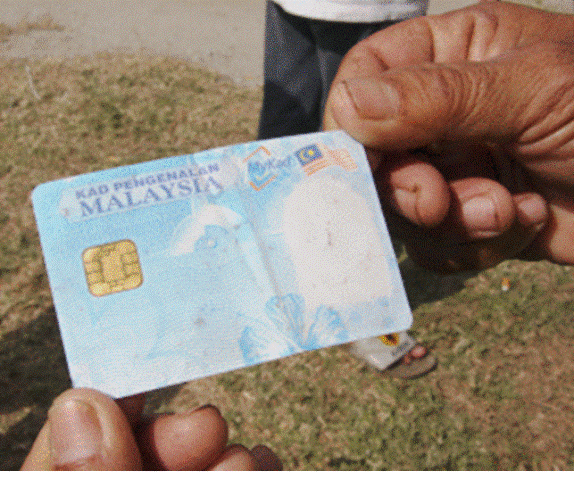
The other point about these late postal ballot ‘entries’, if you will, is that it may lead to electoral fraud and ‘phantom’ voting. One must understand that the electoral roll which is used by the EC officials is the latest gazetted electoral roll in the EC database. For the April Sarawak State Elections, the gazetted electoral roll from 25th March was used (the EC gazettes the electoral roll four times a year, once in each quarter). However because many postal voters were only transferred and added after 25th March (and in fact, only after nomination day), this means that their names are still in the 25th March electoral roll for the constituency which they were originally registered in. It is therefore entirely possible that the same voter who had already cast his or her postal ballot, to also cast a ballot in the constituency which he or she was originally registered in. For those civil servants who were transferred from one Sibu seat to another, it may be possible for them to cast their postal ballot in Seat B, the seat in which they have been transferred to, and still go early to vote in Seat A, the seat in which they were originally registered in. For those who were transferred to Sibu from further away, it may still be possible for such a voter to ‘lend’ his or her IC to a friend or relative in the original constituency to vote on his or her behalf!
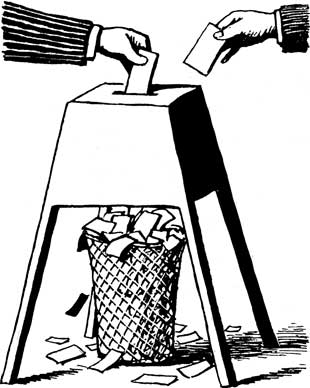
How can these opportunities for electoral fraud be reduced? Ideally, an overhaul of the entire postal voting process should be undertaken. But to address the specific problem identified above, the EC should firstly discourage the practice of last-minute transfers of civil servants from one constituency to another. These civil servants should cast their postal votes for the constituency in which they are registered in according to the latest gazetted electoral roll, in this case, the 25th March electoral roll. For those civil servants who have been transferred from the regular electoral roll to the postal ballot roll within the same constituency (teachers who are called in to be polling clerks, for example), the EC must provide an updated electoral roll to the polling agents from the parties contesting with the names of these voters cancelled out as a means of preventing the occurence of double-voting. We actually had to provide our own polling and counting agents (‘PACAs’) with our own updated electoral roll for a couple of seats in Sibu with these late addition postal voters cancelled out.
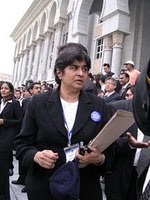
While postal votes have always been an issue of contention during any election, especially in areas with a higher number of these votes, my experience in Sibu has shown me that this is one immediate area of reform which needs to take place and that Bersih 2.0 should spearhead this initiative.
(The concluding part of this article will be published tomorrow as part of this week’s Stories from the East series, where the author will discuss the challenges faced by polling and counting agents)
Ong Kian Ming is a political scientist by training. He currently operates in a context where the ‘science’ of politics is not very well understood whether by voters, politicians or even himself. He hopes that this puzzle will slowly clear itself up, at least in his own head, so that he can justify his 6 years of doing a PhD in political science at Duke University to his wife, his family and his few friends. He can be reached at [email protected]. He is immensely grateful for those of you who bothered to read this article all the way to the end.

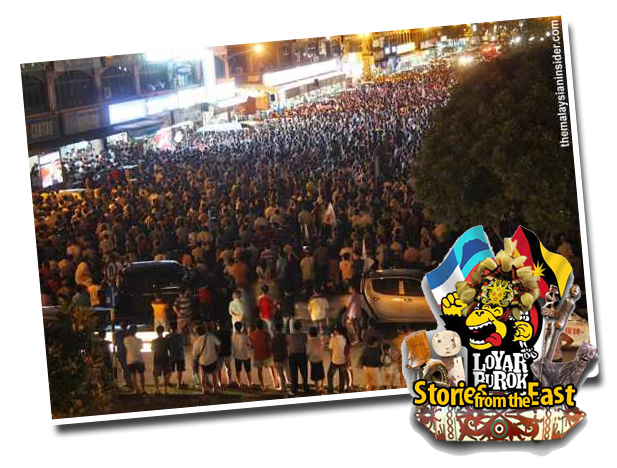
Ayia kalu ada itu DUIT apa pun buli beli mah, EC pun BELI, pagil TIPU. Itu CMsamaPM banyak LUY mah, tapi iu siapa LUY O.
Oooiii bodoh punya fareez shah!
That fella is already a PhD holder lah.
Its good to know that there are still indie insight on sarawak election. Thank you for the article, and good luck in pursuing ur PhD